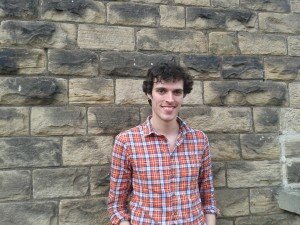Matt Wood, Deputy Director of the Crick Centre, reflects on the success of the Crick Centre’s public debate The EU Referendum: What Does it Mean for Sheffield? and calls for more ways to engage people to think “slowly” about politics.
Politics is a perplexing subject at the best of times, but no more so than when we consider the EU referendum. Getting your head round the multiple institutions, the regulations, grants, and other complex arrangements when trying to think about how to vote this June can seem daunting and time consuming. In fact, it’s almost tempting to discard these in favour of the straightforward, yet vacuous mantras of the Leave or Remain campaigns: ‘Stronger In’ or ‘Take Control’. Of course, the real issues lie somewhere in between. As Gerry Stoker and Colin Hay show, people tend to think ‘quickly’ about politics rather than ‘slowly’, and this can mean they don’t give the issues the full attention they merit. With so much at stake in the referendum, taking time to think about the issues and hear important information about a complex subject is more important than ever.
Last night at St Mary’s Church in Sheffield we tried to engage the public in a bit of ‘slow thinking’ about the EU referendum. Nearly 200 people came along to hear a mixture of academic and public speakers talk about the nuances, and help them understand what issues are at stake if we chose to leave, or indeed remain. In a packed out venue we heard about the different models Britain might adopt if it left – the Canadian, Norwegian or Swiss approaches – and the different forms of migration and how they are governed. We heard about how EU institutions are quite technocratic and in any event – remain or leave – ought to be politicised. And we listened to personal stories of how local businesses trade with Europe and voluntary organisations receive funding from European grants.
Matt Wood, chairing the #SheffieldEU debate at St Mary’s Church
How should people vote – leave or remain? That wasn’t our question. We wanted to give people the information and provide a forum for them to discuss and debate the issues. Questions ranged from the specific – what would have happened in Sheffield had we not joined the common market in 1975? – to the abstract – “what does it mean to be European?” and “is the EU destined to fail?”. We also took a digital poll of the audience’s opinions at the start and end, to gauge whether we’d helped them with thinking about the complexities.
In all, the event seemed to help people make their mind up. At the start of the night 75% knew how they were going to vote – a similar or greater percentage than the general trend of depending on which poll you read. By the end this was up by 12 points to 87%. Interestingly, when they came in most of the audience were unclear how the referendum would impact Sheffield, and thought the evidence on either side of the debate was fuzzy. The personal and general information and discussion seemed to have had some impact.
Of course, as one audience member mentioned to me afterwards, the group was somewhat self-selecting. While we managed to engage a relatively big public audience, the people who came along were likely already interested in politics, and therefore already had strong opinions about the issue. Open public events generally don’t proceed with a ‘sampling strategy’. By contrast, there are specific groups – often younger, poorer voters – who are disengaged and unlikely to vote in the referendum. With two months to go to these sorts of events need to engage these sorts of people. The trick for us in the Crick Centre is to think about how we reach out even further in the long term, to engage people who would never usually get the chance to think ‘slowly’ about politics.

Biography
Matt Wood is a postdoctoral research associate and Deputy Director of the Sir Bernard Crick Centre for the Public Understanding of Politics (Crick Centre). He has previously worked in local journalism and lobbying, and has held visiting fellowship positions at the UK Cabinet Office and ANZSOG Institute for Governance, University of Canberra.
Matt is responsible for the Crick Centre’s research strategy, and heads up the research strand on ‘Media, Science and Technological Change’. His research at the Crick Centre currently includes the study of everyday politics, celebrity politicians, the politics of normality, co-production as an approach to social research, and the concept ‘hyper-democracy’. Matt also edits the Crick Centre’s Understanding Politics blog.
Matt is currently undertaking a three-year ESRC Future Research Leaders Fellowship, studying how delegated bodies can improve trust and support for their work from stakeholders in volatile political environments. This project will involve case studies in food safety, health technology regulation and disease control and prevention, and use an innovative ‘impact-led’ methodology including co-production.
Note: This article gives the views of the author, and not the position of the Crick Centre, or the Understanding Politics blog series





